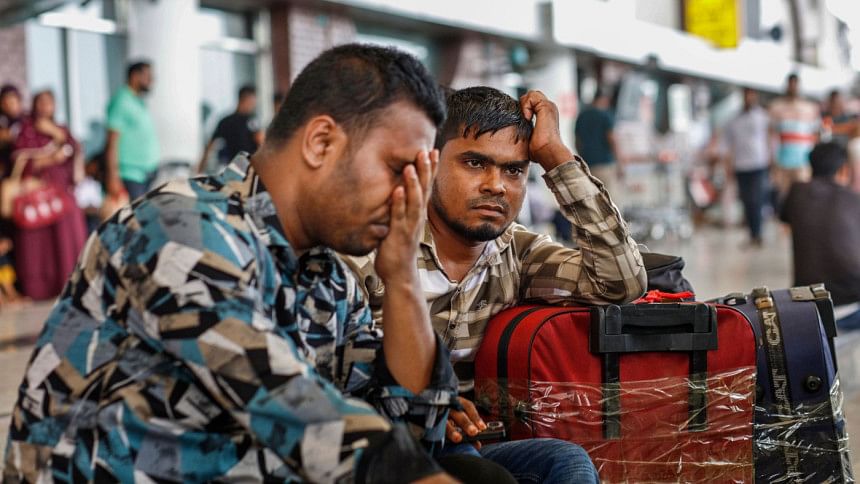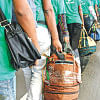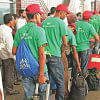Break the syndicates, not the dreams of Malaysia-bound workers

Thousands of Bangladeshi workers have been unable to go to Malaysia because they did not get a plane ticket even after completing all the procedures, including obtaining a visa by spending several times more than the prescribed fee. On Friday, several hundred workers waited for hours at the Hazrat Shahjalal International Airport to catch flights, but most of them could not do so.
In fact, no reliable information is available on the exact number of workers who failed to go to Malaysia. According to an estimate of Bangladesh Association of International Recruiting Agencies (Baira), this number is 5,953. Bangladesh government's Bureau of Manpower, Employment and Training (BMET) says that this number is 31,000. And according to the information of the Bangladesh High Commission in Kuala Lumpur, this number is about 55,000.
The Malaysian government had earlier announced on March 21 that the labour market for migrant workers will be closed on May 31. This means that the Ministry of Expatriates' Welfare and Overseas Employment, Bureau of Manpower, Employment and Training (BMET) and Baira had 70 days to make arrangements for aspirant migrant workers to go to Malaysia. But having not taken proper initiative in time, thousands of workers could not finish this journey. Due to the flight crisis, those who were able to go had to pay several times the actual airfare. Fares increased from Tk 20,000-25,000 to more than Tk 100,000.
The government does not have to spend money to send workers abroad. The workers arrange the money by themselves, often by taking loans or selling property, or by contacting brokers, and then through hard work, they send US dollars back to the country. Thus, the government enjoys the hard-earned dollars of these migrant workers at almost no cost. In return, the minimum obligation of the government should be to ensure that these workers can go and work abroad for a fixed fee without being harassed. But it appears that the government is not interested in taking even these minimal responsibilities, as a result of which thousands of workers are being cheated and exploited by local and foreign interest groups, including recruiting agencies.
According to a memorandum of understanding signed between Bangladesh and Malaysia in December, 2021, a Bangladeshi worker who wants to travel to Malaysia and work there would needs to spend no more than Tk 78,990 for the passport, health check-up, registration, welfare, insurance, identity card, clothing, and recruitment agency fees. Malaysian employers were supposed to pay for the plane ticket and visa.
In practice, as reported by The Daily Star, a syndicate of 100 Bangladeshi recruiting agencies holds monopoly control over sending workers to Malaysia, and this has increased the cost for aspirant migrant workers. If any agency wants to send workers to Malaysia, it has to send them through this syndicate. Recruiting agencies have to pay huge sums of money to syndicate leaders to become members of the syndicate. The agencies, in turn, recoup that money from migrant workers.
" layout="left"]The agencies that are part of the syndicate get a huge amount as "syndicate fee" against each worker, and a part of this money goes to those controlling the Malaysian syndicate. Even though the looting of migrant workers in this way is an open secret, there has been no initiative from the government to break this syndicate.
And why would it take any initiative? According to a report by Prothom Alo, several Bangladeshi parliamentarians and their relatives, along with some political leaders of the ruling party, are part of this syndicate. Notables among the members of the syndicate are Awami League MP (Feni-2) Nizam Uddin Hazari's Snigdha Overseas Limited; Jatiya Party MP (Feni-3) Masud Uddin Chowdhury's 5M International; Ahmed International of Dhaka-20 MP Benjir Ahmed; Orbitals Enterprise of Kashmeri Kamal, wife of former finance minister and current MP for Comilla-10, AHM Mustafa Kamal, and Orbitals International of Nafisa Kamal, AHM Mustafa Kamal's daughter.
On one hand, the workers are forced to go to Malaysia by spending several times more money due to the monopoly of the syndicate which exists under the patronage and participation of the ruling party members. On the other hand, workers are forced to live an undignified life even after going to Malaysia due to not getting the employment they are promised.
The situation is so bleak that, the Office of the United Nations High Commissioner for Human Rights (OHCHR) issued a statement on April 19 where UN experts expressed dismay about the situation of Bangladeshi migrants in Malaysia. They expressed concern that large sums of money were being generated through the fraudulent recruitment of migrant workers by criminal networks operating between Malaysia and Bangladesh. They said migrants were being deceived, recruited by companies that are frequently fake, and obliged to pay exorbitant recruitment fees which pushes them into debt bondage. The experts held some high-level officials in both governments responsible for this situation and called for an immediate end to this exploitation.
It is noteworthy that, although the UN issued a statement on the plight of Bangladeshi migrant workers in Malaysia, no action was taken by the Bangladeshi government—the principal beneficiary of the remittances sent by the migrant workers—to address the sufferings of the workers.
Malaysia has long been an attractive destination for Bangladeshi migrant workers. Although the government beats the drum of economic development, the reality is that there is a dire shortage of good wage employment in the country. According to the Bangladesh Bureau of Statistics' "Labour Force Survey-2022," a Bangladeshi migrant worker earns Tk 28,822 a month in Malaysia on average compared to Tk 24,957 in Saudi Arabia, making Malaysia more attractive for Bangladeshi workers compared to traditional markets in the Gulf.
However, the Bangladesh-Malaysia migration has been marred by irregularities and exploitation in the past, which has prompted Malaysia to shut its door on Bangladeshi workers on multiple occasions. According to a Prothom Alo report, Malaysia's labour market was closed in 2009 due to allegations of irregularities in sending workers by creating syndicates. Then the market opened at the end of 2016, and was closed again from September 2018 due to allegations of syndication, corruption and irregularities. After four years of closure, the Malaysian labour market reopened for Bangladeshis in 2022. The syndicate was created once more. It is in this context that Malaysia announced that it will no longer take workers from some countries, including Bangladesh.
These syndicates should no longer be tolerated. Recruiting agencies engaged in fraudulent practices in sending workers abroad should be stopped immediately. The workers who could not go to Malaysia even after paying several times more money this time should be compensated properly and the recruiting agencies and relevant government authorities should be made accountable.
Kallol Mustafa is an engineer and writer who focuses on power, energy, environment and development economics. He can be reached at [email protected].
Views expressed in this article are the author's own.
Follow The Daily Star Opinion on Facebook for the latest opinions, commentaries and analyses by experts and professionals. To contribute your article or letter to The Daily Star Opinion, see our guidelines for submission.

 For all latest news, follow The Daily Star's Google News channel.
For all latest news, follow The Daily Star's Google News channel. 











Comments